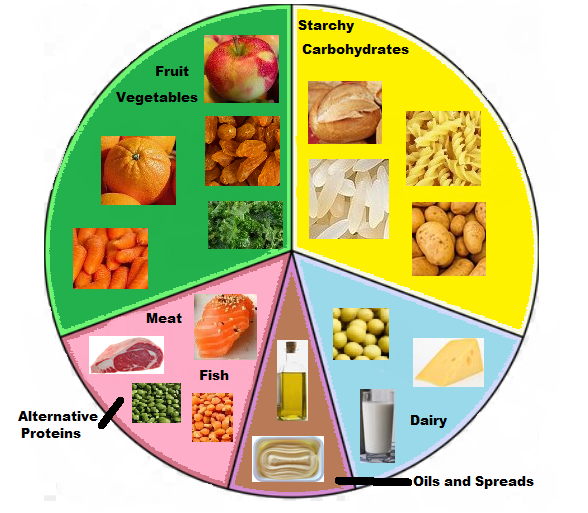Eating a Balanced Diet
Eating a balanced diet is essential for supporting overall health and optimising athletic performance. Athletes should tailor their diet to meet their individual energy needs, timing meals around training sessions and competitions. Special diets may be necessary for individuals with specific dietary requirements, while strategies like carbohydrate loading and high-protein diets can benefit performance when used appropriately and in moderation.
Eatwell Guide:

The Eatwell Guide is a visual representation of the types and proportions of foods that make up a healthy, balanced diet. It divides foods into five main groups: fruits and vegetables, starchy carbohydrates, protein sources, dairy and alternatives, and oils/fats. The guide recommends consuming a variety of foods from each group in appropriate proportions to ensure adequate intake of nutrients.
Diet and Physical Activity for Athletes:
Athletes require specific dietary considerations to support their training, performance, and recovery.
The amount of food an athlete needs depends on factors such as training intensity, duration, body composition, and metabolic rate.
The total energy requirement can be calculated using the Basal Metabolic Rate (BMR) plus the Physical Activity Level (PAL).
Basal metabolic rate (BMR) + physical activity level (PAL) = total energy requirement.
When to Eat:
Timing meals and snacks around training sessions and competitions is crucial for optimising performance and recovery.
Pre-exercise meals should provide energy and be easily digestible, consumed 1-4 hours before activity.
Post-exercise meals and snacks should include carbohydrates to replenish glycogen stores and protein to support muscle repair and growth, consumed within 30-60 minutes after activity.
What to Eat - Special Diets:
Some individuals may have special dietary requirements due to allergies, intolerances, medical conditions, or personal beliefs.
Special diets may include vegetarian, vegan, gluten-free, dairy-free, or low-FODMAP diets.
It's essential to ensure that special diets still provide all necessary nutrients for health and performance.
Carbohydrate Loading:
Carbohydrate loading is a strategy used by endurance athletes to maximise glycogen stores before an event.
It involves consuming a high-carbohydrate diet combined with tapering exercise in the days leading up to the competition.
Carbohydrate loading can enhance endurance performance by delaying fatigue and improving glycogen availability.
High-Protein Diets:
High-protein diets are popular among athletes and individuals seeking muscle growth and recovery.
Protein is essential for muscle repair, growth, and maintenance.
Athletes may require higher protein intake, but excessive protein consumption does not necessarily lead to greater muscle gains and may strain the kidneys.
Optimal protein intake for athletes is typically around 1.2-2.0 grams per kilogram of body weight per day.
